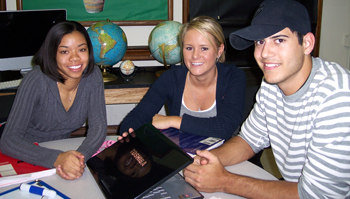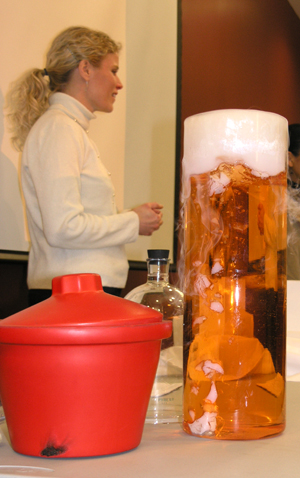S-STEM Grant to Provide Scholarships for Biology, Chemistry, & Math Merit Students
July 2, 2012

Students work in a group during a Merit section at Illinois.
She wants to study chemistry at Illinois. She's familiar with the university because her mom went to school here. But because she lives out of state, it's too expensive. So instead, she's been going to a local college. However, she's been quite discouraged, because she wants to come to Illinois.
This is the kind of student for whom the Merit Fellows Scholarship Program may be able to provide assistance. Funded by a 5-year, $525,000 National Science Foundation S-STEM grant (Scholarships in Science, Technology, Engineering, and Mathematics), this program will provide financial support for academically talented, financially needy Merit students majoring in mathematics, chemistry, or integrative biology. Three scholarships will be given the spring semester of the first year of the grant (2012–2013), with an additional six students added each consecutive year. Provided recipients maintain their GPA and meet program requirements, their scholarships will be renewed through the five years of the program. Rather than supporting a larger number of students for, say, one year, the goal of the grant was to provide a smaller number of students support through to graduation. Says Gretchen Adams, the Merit Director in the Department of Chemistry: "We want them to be supported all the way through as much as possible."

Merit Directors Tracey Hickox (Integrative Biology), Jennifer McNeilly (Math),
and Gretchen Adams (Chemistry)
The S-STEM grant, written by PI Bob Muncaster from the Department of Mathematics and Merit Directors Gretchen Adams (Chemistry), Tracey Hickox (Integrative Biology), and Jennifer McNeilly (Math), builds on the work the Merit and the MIST (Merit-Based Immersion for Students and Teachers) programs have done on campus. These programs have had a positive impact both in recruiting and retaining students in biology, chemistry, and mathematics, especially students who have not declared their major and who are from among traditionally under-represented groups, such as minorities, women, and rural students.
To be eligible for the scholarship, students have to be declared majors in chemistry, biology, or mathematics and be participating in Merit, with preference given to students from underrepresented groups. They will be interviewed by an advisory committee consisting of a faculty member, a representative from LAS' Access and Achievement Program, and the Merit Directors from the three departments.
Why is there a need for a scholarship program such as this? According to data and the Access and Achievement Program, the percentage of underrepresented minorities at Illinois enrolled in chemistry, for instance, is going down. Adams believes one reason is the cost.

Gretchen Adams prepares to do a chemistry presentation for high school students making a campus visit.
"We are having students, particularly in the STEM areas, (because it is more expensive to be a STEM major), that just cannot afford it…they literally have an outstanding bill from the fall, and they don't even return in the spring. They just can't register because they can't make the payments. We have students that want to come here, but they just can't afford Illinois; it is just too expensive; so they are going to go to some place that is closer to home or a cheaper university."
Another reason for the decline is the fact that scholarships that are available do not provide enough money, thus students have to work. The writers of the grant also wanted to provide enough money so students wouldn't have to work in a job that wasn't STEM related.
"Even though we have these other scholarships," says Adams, "they are just not at large enough amounts. Students have to work, and they are working at jobs that are not supportive in their STEM area…not building them in STEM…We found research that says students that have to work don't do as well…We analyzed the financial aid packages that students get, and they don't cover everything for them at all…So we went with the premise that if we really want to support students, it must be at a higher level so that they don't have to work at jobs that are non-STEM-related."
Adams believes the scholarship money will make a huge difference for some students.
"We are excited. We always wanted to find a way to get students a scholarship and money. I think that all of us can relate to that. I had to pay for a ton of my education, so we value that, and know how hard it is. Any way that we can support a student, we are all about that. So we are really excited, because this is one way that we can support them that we haven't been able to before from the financial aspect."
The Merit Fellows Scholarship Program will provide more than just money. Tracey Hickox, Merit Director for Integrative Biology, believes the opportunity students will have to be mentored, as well as participate in research, will be particularly beneficial.
"One of the main things I'm really excited about is that this S-STEM grant is going to provide an opportunity for students to work in research labs, have not only a faculty mentor, but a peer mentor, and hopefully be able to travel to present research as an additional experience here at Illinois."
These peer and faculty mentors will provide guidance and help scholars navigate through rigorous STEM majors. Faculty mentors are currently being recruited; once the program has been in operation for a few years, the older Fellows, as juniors and seniors, will mentor the younger students. Until then, Merit students within the students' majors will serve as peer mentors.
Peer mentors will plan activities for scholarship recipients; they will coordinate events, organize study sessions, work with Merit TAs to help make Fellows' experiences better, help them navigate difficult courses, and encourage them to get involved in STEM clubs. Other supports will include seminars about effective STEM study strategies, special speakers, and social functions. And as mentioned earlier, Merit Fellows will be encouraged to participate in undergraduate research opportunities.

Two students work together on Merit section worksheet.
The Merit directors from the three departments are confident that the combination of money and the various supports should give the students the self-confidence to succeed, in part by conveying that their department and the university believe in them. According to Jennifer McNeilly, the Merit Director from Math, a benefit of the program is "the chance to give students from underrepresented populations and small rural schools a very substantial financial support and mentorship support to show them how important they are to the university and how much we really are committed to seeing them succeed in the STEM fields. We think that can make a big difference in their confidence, because we know that's something they struggle with at times. So that's something else that we think this is going to be really helpful for."
Adams She believes it will "show them that we are very confident in them. 'We are giving you all this money because we believe you should be in this major. We really believe in you, and support you with these mentors, financially, and academically through Merit. We believe in you as a whole.'"
Adams believes the program expresses the commitment of both the departments and the university to "get more STEM majors into the work force that are from underrepresented groups." According to Adams, a more diverse work force could have a long-term benefit to our society: "Right now, the numbers are so low from underrepresented groups…that it is devastating. There should be more, because when you have a more diverse work force, they are going to investigate things that are more diverse, and that could help society overall."
She also believes the Merit Fellows Scholarship Program could serve as a model to other programs and other universities, particularly in the areas of faculty and peer mentoring.
"If the faculty mentoring goes well, that could be a model on the way faculty mentoring should be done, and how it can be done [at] a top tier institution with high-profile researchers—that they are able to mentor, and it makes a huge difference. Or if it doesn't go well, then why is it not going well? And the importance of…peer mentoring. Is it a model to use to get other students through? So it can really make the university look great and the same thing for the department."
The Merit Program Directors are looking forward to the start of the program and the impact it's going to have for a number of students who are interested in STEM careers:
"We are really excited about the S-STEM grant," says McNeally. We think we're going to be able to make a difference in students' lives, not only financially, but hopefully by providing some mentorship, and getting them a peer mentor and a faculty mentor, and more support in their freshman and sophopmore years, and help them succeed in their STEM careers going forward."
According to Adams, just the possibility of a scholarship down the road has already made a difference for the student mentioned above. The student is currently working to make herself eligible by taking chemistry classes that will transfer. Will the S-STEM grant have a further impact on this student? Adams is hopeful: "We will see how that turns out."
Author: Elizabeth Innes, Communications Specialist, I-STEM Education Initiative
More: Biology, Chemistry, Funded, Math, Underserved Minorities, 2012













.jpg)
















